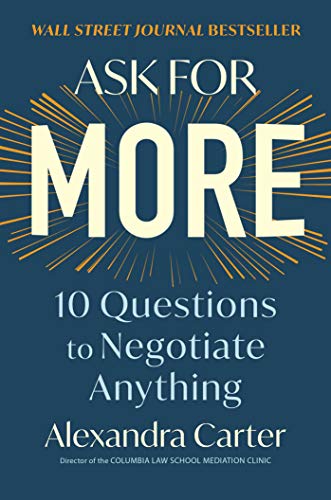Overview of “Ask for More: 10 Questions to Negotiate Anything” by Alexandra Carter Link to heading
Summary Link to heading
“Ask for More: 10 Questions to Negotiate Anything” by Alexandra Carter is a book that redefines the process of negotiation, emphasizing the power of asking the right questions. Carter, a negotiation expert and a clinical professor at Columbia Law School, introduces a framework of ten questions designed to unlock effective communication and negotiation in various aspects of life, from professional to personal interactions. The book is divided into introspective and interactive questions, encouraging readers to first understand their own needs and desires before engaging with others. It highlights negotiation as a means of fostering understanding and finding mutually beneficial solutions.
Review Link to heading
The book has been well-received for its practical and accessible approach to negotiation. Carter’s insights are grounded in real-world examples and her professional experience, making the content relatable and easily applicable. The strengths of the book lie in its clear structure, actionable advice, and emphasis on empathy and listening as core components of successful negotiation. Some readers might find the principles familiar, as they echo established negotiation theories, but Carter’s unique framing and focus on questions offer fresh perspectives. The book’s approachability might mean it lacks depth for those seeking advanced negotiation strategies or theories.
Key Takeaways Link to heading
- Introspection Before Interaction: Before negotiating with others, it is crucial to ask yourself questions to clarify your own goals, needs, and boundaries.
- The Power of Open-Ended Questions: Use open-ended questions to gather information and foster dialogue, which can lead to more creative and satisfying outcomes.
- Empathy and Listening: Successful negotiation is built on understanding the other party’s perspective, emphasizing listening over talking.
- Flexibility and Adaptation: Be willing to adapt your strategy and approach based on the responses and needs of the other party.
- Building Relationships: Effective negotiation is about building and maintaining relationships, not just closing deals or winning arguments.
Recommendation Link to heading
“Ask for More” is highly recommended for anyone looking to improve their negotiation skills, whether they are new to negotiation or seasoned practitioners seeking a fresh perspective. It is particularly beneficial for those who value empathetic communication and are interested in approaches that prioritize understanding and collaboration over confrontation. The book’s practical framework makes it a useful tool for professionals in business, leaders, educators, and anyone interested in enhancing their personal communication skills.
